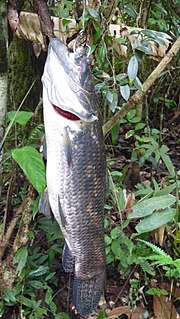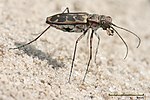A bioindicator is any species (an indicator species) or group of species whose function, population, or status can reveal the qualitative status of the...
44 KB (4,955 words) - 05:58, 24 November 2024
Mollusca (section Bioindicators)
transport or "goldrush" behavior appeared. Bivalve molluscs are used as bioindicators to monitor the health of aquatic environments in both fresh water and...
98 KB (9,825 words) - 00:31, 19 November 2024
Posidonia oceanica (section As a bioindicator)
indicator. In fact, the plant has all the characteristics of a good bioindicator: It is a benthic species; Has a long life cycle; Is widespread throughout...
23 KB (2,767 words) - 22:23, 29 September 2024
Pesticide contamination in the environment can be monitored through bioindicators such as bee pollinators. In one study, the human health and environmental...
94 KB (9,523 words) - 16:11, 19 November 2024
widespread, and susceptible to the West Nile virus, making them useful as a bioindicator to track the virus's spread. Direct transmission of the virus from crows...
30 KB (3,368 words) - 01:58, 23 November 2024
linked to the consumption of contaminated fish. H. aimara is a good bioindicator of such contamination. This is the largest of the Hoplias species with...
5 KB (545 words) - 00:06, 10 October 2024
J.; Botes, Antoinette (2002). "The verification and application of bioindicators: A case study of dung beetles in a savanna ecosystem". Journal of Applied...
155 KB (16,986 words) - 02:21, 17 November 2024
Marchantia polymorpha is a species of large thalloid liverwort in the class Marchantiopsida. M. polymorpha is highly variable in appearance and contains...
13 KB (1,299 words) - 08:50, 7 November 2024
Lichen (category Bioindicators)
Common lichen growth forms A lichen (/ˈlaɪkən/ LY-kən, UK also /ˈlɪtʃən/ LITCH-ən) is a hybrid colony of algae or cyanobacteria living symbiotically among...
132 KB (14,357 words) - 17:33, 11 November 2024
Photobacterium phosphoreum (section As a bioindicator)
Photobacterium phosphoreum is a Gram-negative, bioluminescent bacterium living in symbiosis with deep-sea marine organisms, such as anglerfish. It can...
3 KB (245 words) - 17:34, 5 April 2024
Pediastrum (section Use as a bioindicator)
of study. These special characteristics make Pediastrum useful as a bioindicator. Therefore, Pediastrum is very useful in the fields of paleoecology and...
12 KB (1,192 words) - 08:01, 22 April 2024
streams like the ones it inhabits). Furthermore, it is considered a good bioindicator of trace metals in the ecosystems of the Yucatán Peninsula, because of...
22 KB (2,540 words) - 21:55, 15 July 2024
Astyanax altiparanae (section Role as a bioindicator)
general adaptability, A. altiparanae is an ideal species to use as a bioindicator for various aspects of ecosystem health. This is especially the case...
48 KB (5,496 words) - 01:49, 16 July 2024
Trace fossil (category Bioindicators)
Look up ichnofossil in Wiktionary, the free dictionary. A trace fossil, also known as an ichnofossil ( /ˈɪknoʊfɒsɪl/; from Greek: ἴχνος ikhnos "trace,...
48 KB (5,497 words) - 08:28, 11 November 2024
Pearson, David L.; Barrera, Roberto R. (1998). "A test for the adequacy of bioindicator taxa: Are tiger beetles (Coleoptera: Cicindelidae) appropriate indicators...
23 KB (2,155 words) - 00:37, 1 November 2024
sensitive to marine pollution. The common starfish is considered to be a bioindicator for marine ecosystems. A 2009 study found that P. ochraceus is unlikely...
105 KB (11,408 words) - 20:21, 18 November 2024
Astyanax bimaculatus (section Role as bioindicator)
(such as cancer). A. bimaculatus can be used as a biological indicator (bioindicator) of pollutants that may be genotoxic, based upon the formation of micronuclei...
42 KB (4,561 words) - 18:45, 24 August 2024
common to all bioindicators, as some may act as indicators for a different environmental factor, such as the pool frog acting as a bioindicator of water quality...
33 KB (2,952 words) - 06:09, 19 November 2024
reserves: the case of the Mexican deer mouse (Peromyscus mexicanus) as a bioindicator". Integrative Zoology. 14 (5): 422–434. doi:10.1111/1749-4877.12371....
17 KB (1,690 words) - 04:04, 25 November 2024
"Erotic lactation". Breast milk is oftentimes used as an environmental bioindicator given its ability to accumulate certain chemicals, including organochlorine...
85 KB (8,713 words) - 04:37, 7 November 2024
119Z. doi:10.1016/j.ecolmodel.2018.05.008. S2CID 90384249. "Frogs | Bioindicators". Savethefrogs.com. 2011. Retrieved 2014-01-21. Mazzotti, F.J.; Best...
97 KB (12,168 words) - 06:24, 21 November 2024
The latter reputation is mainly based on the absence of present-day bioindicators, especially immunological and statistical tools developed in light of...
126 KB (14,471 words) - 20:40, 22 November 2024
Arnica does not grow on lime soil, thus it is an extremely reliable bioindicator for nutrient poor and acidic soils. It is rare overall, but may be locally...
15 KB (1,551 words) - 10:05, 16 September 2024
Benthos (section Benthos as bioindicators)
organisms ideal for studying water contamination. Benthos can be used as bioindicators of water pollution through ecological population assessments or through...
25 KB (2,512 words) - 20:09, 24 November 2024
their sensibility and rapid response to environmental changes, good bioindicators for artificial night lighting. Significant declines in some insect populations...
146 KB (15,572 words) - 14:15, 16 November 2024
Marine snow (category Bioindicators)
In the deep ocean, marine snow (also known as "ocean dandruff") is a continuous shower of mostly organic detritus falling from the upper layers of the...
22 KB (2,737 words) - 21:03, 24 June 2024
hydrocarbons (TPH), surfactants and pesticides. The use of a biomonitor or bioindicator is described as biological monitoring. This refers to the measurement...
61 KB (8,712 words) - 16:01, 14 November 2024
of applications that also can be supported by early warning systems. Bioindicator — a species that reveals the status of the environment Emergency communication...
12 KB (1,350 words) - 04:31, 9 October 2024
30–50% of benthic foraminifera (single-celled species which are used as bioindicators of the health of a marine ecosystem)—one of the largest in the Cenozoic...
107 KB (11,853 words) - 08:38, 12 November 2024
Copepod (category Bioindicators)
Copepods (/ˈkoʊpəpɒd/; meaning "oar-feet") are a group of small crustaceans found in nearly every freshwater and saltwater habitat. Some species are planktonic...
39 KB (4,274 words) - 04:20, 17 November 2024





























